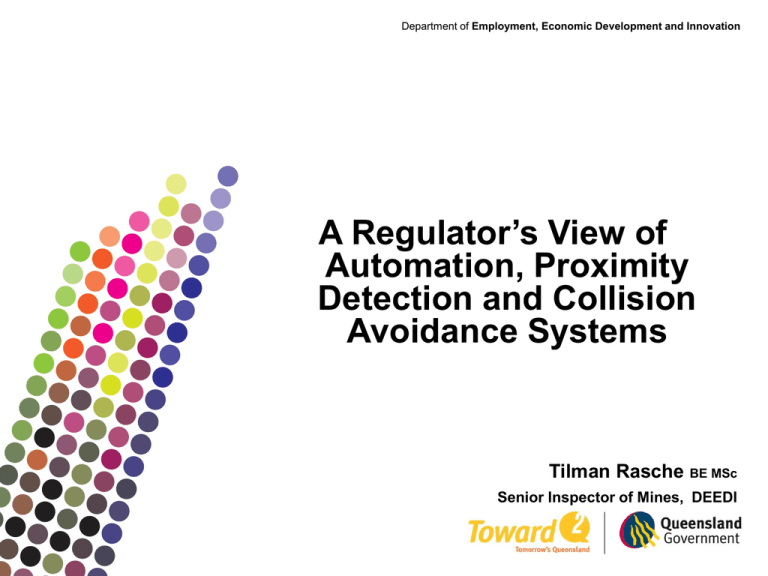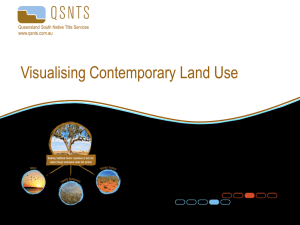A Regulator`s View of Automation, Proximity Detection and Collision
advertisement

Department of Employment, Economic Development and Innovation A Regulator’s View of Automation, Proximity Detection and Collision Avoidance Systems Tilman Rasche BE MSc Senior Inspector of Mines, DEEDI Link between Proximity Detection and Automation Triumph of partial and full automation will depend on the success of proximity detection and collision avoidance technologies and approaches. Therefore …. We can learn from our current experience (successes and mistakes) © The State of Queensland, Department of Employment, Economic Development and Innovation, 2010 2 Assumptions….. Two blondes living in Brisbane were sitting on a parkbench talking........ and one blonde says to the other, "Which do you think is further away..........Melbourne or the moon?" The other blonde turns and says "Helloooooooooo, can you see Melbourne ...?????" © The State of Queensland, Department of Employment, Economic Development and Innovation, 2010 3 Dictionary Assumptions are beliefs or ideas that we hold to be true — often with little or no evidence required. We make assumptions every day of our lives… …. blondes have more fun…. …. the earth is flat….. …. as a driver on the highway, I assume that other drivers will obey traffic signals, so that when I go through an intersection with a green light, I assume that the cross traffic will stop at its red light. © The State of Queensland, Department of Employment, Economic Development and Innovation, 2010 4 Stats from the US - perspective 11% 4.5 in 1000, 1 in 222 http://lifesavers.ky.gov/lifesavers_2006/session17-allred.ppt#671,2,Red Light Running © The State of Queensland, Department of Employment, Economic Development and Innovation, 2010 5 Assumptions ‘solve’ a lot of problems we would otherwise have to investigate and answer for © The State of Queensland, Department of Employment, Economic Development and Innovation, 2010 6 Scientific investigation into large scale accidents has allowed us to come a long way ~ 3 out of 4 = ~ 75% - vehicle related © The State of Queensland, Department of Employment, Economic Development and Innovation, 2010 7 Why do we see what we see… Increasing dependence on mine vehicles – OC & UG More & more vehicles, increase in size & speed – Visibility and space around machine – Operator & worker behaviour – Recurring accidents – Same picture worldwide Key mining hazard but there are solutions – Need to clarify assumptions…… Its up to all of us to solve the problem…. © The State of Queensland, Department of Employment, Economic Development and Innovation, 2010 8 HPIs as of March 2011 © The State of Queensland, Department of Employment, Economic Development and Innovation, 2010 Source : DEEDI - Serious accidents and high potential incidents Mining and 9 Quarrying Compilation of reports for March 2011 ‘Pegging’ the Risk - Rank Likelihood Consequence Assumptions?? Almost certain Catastrophic Major Most likely consequence? (eg permanent disability) Moderate (eg medical / hospital treat) Minor (eg first aid) Insignificant Likelihood? Possible Unlikely Rare (has happened) (heard of it happening) (not likely to happen) (almost impossible) 1 2 4 7 11 3 5 8 12 16 6 9 13 17 20 10 14 18 21 23 15 19 22 24 25 (common / repeating) (eg fatality) Maximum reasonable consequence? Likely (eg no injury) injury) © The State of Queensland, Department of Employment, Economic Development and Innovation, 2010 10 Hazards • • • Moving equipment (‘tons’ of kinetic energy - CAT 797F, payload 360 ton GVM 623 tons, 3,800 HP, top speed 67 km/h, 14.8m long, ~10m wide) Boeing 747-400 178 tons 3.5* LTA visibility LTA hazard awareness © The State of Queensland, Department of Employment, Economic Development and Innovation, 2010 11 Automation CAS NOW © The State of Queensland, Department of Employment, Economic Development and Innovation, 2010 12 Basic design assumptions What is the basis for …. • • • • • Road widths - 3.5 rule Separation distances – vehicles in motion require ??? m to stop Maximum allowable speeds to allow safe braking Queuing and parkup distances Detection envelopes for proximity detection technology – cloverleafshape??? • Where is the empirical data to substantiate the above??? • Braking distances • Operator reaction times • How will people react? We too often assume we know what the problem is © The State of Queensland, Department of Employment, Economic Development and Innovation, 2010 13 Engineering Assumptions Q: What is the braking distance of xyz haultruck? (50 km/h, level ground, dry road, loaded) Q: What is the minimum length of runway for the safe landing of a Boeing 747? A: Google © The State of Queensland, Department of Employment, Economic Development and Innovation, 2010 http://www.boeing.com/commercial/airpor ts/acaps/747_4.pdf 14 © The State of Queensland, Department of Employment, Economic Development and Innovation, 2010 15 What is the problem? V2V V2P slow speed e.g. Parkup areas V2V – overtaking collision V2V – high speed rear end collision V2V - rear end collision V2V – slow speed rear end collision V2V collision or reversing over dump V2V – head on collision V2I or V2P forward collision V2V V2P V2I reversing collisions V2V collision - intersection V2V collision – mining face V2V collision – fast –slow moving vehicles © The State of Queensland, Department of Employment, Economic Development and Innovation, 2010 16 Typical Underground Scenarios, there are many more….. Continuous Miner No Go-Zones ! © The State of Queensland, Department of Employment, Economic Development and Innovation, 2010 17 Example – design decision partially responsible for mining deaths MSHA - UG Fatalities - Continuous Miner 29 fatalities or 72% of victims were operating the remote at the time of the accident. Most/all could be avoided if Proximity Systems had been available and installed Legend X Victim location Operating the remote Not operating the remote A moving RCCM collided with another at an intersection, causing the stationary RCCM to pivot and crush the other Op © The State of Queensland, Department of Employment, Economic Development and Innovation, 2010 Maintenance activity 18 Stopping distance Acknowledged braking capability Behavioural expectation © The State of Queensland, Department of Employment, Economic Development and Innovation, 2010 19 ‘There are only so many ways to kill people, and we know them all’ © The State of Queensland, Department of Employment, Economic Development and Innovation, 2010 20 ? ? Visibility = Opportunity to identify a hazard & react in time © The State of Queensland, Department of Employment, Economic Development and Innovation, 2010 21 Shuttlecar or Truck © The State of Queensland, Department of Employment, Economic Development and Innovation, 2010 Miner 22 Person vs. Machine 1 Human Reliability - People are inherently unreliable Mental processing time • • Sensory – perception/recognition Interpretation – what does this mean – friend or foe? (Car stopped in the middle of the road) • Response Selection – what happens next? Expectation • • • Expected to brake – 0.7 secs = 0.5 secs perception 0.2 secs movement Unexpected – 1.25 secs = 1.05 secs perception 0.2 secs movement Surprise – 1.5 secs =1.2 secs perception 0.3 secs movement Movement time • Brake engagement time – foot movement, on pedal, depress, mechanical delays © The State of Queensland, Department of Employment, Economic Development and Innovation, 2010 23 Person vs. Machine 2 Other factors • Urgency – time to collision • Cognitive load – ‘non driving’ matters – music, mobile phone, autopilot • Age ~ lower levels of fitness ~ lower response capability • Gender • Nature of signal – can it be seen? Is it distinct? Is the vehicle in front accelerating/decelerating? Aspect – frontal/from side • Visibility vs recognition • Reaction time at night – visual contrast (amber/yellow brown shooting glasses) • People will make mistakes (wrong decisions) © The State of Queensland, Department of Employment, Economic Development and Innovation, 2010 24 Distance travelled m 90 85 Distance travelled (m) vs time (secs) 80 75 5 km/hr 70 65 20 km/hr 60 55 40 km/hr 10 km/hr 30 km/hr 50 km/hr 50 45 40 35 30 25 20 15 10 5 0 1 2 © The State of Queensland, Department of Employment, Economic Development and Innovation, 2010 3 Time secs 4 5 25 Tilmans ‘Meaning of Life’ Ver.1.0 HR Risk 2. Project/Change Issue RA eg. Coll. Awareness 3. Routine & Non Routine Task Planning RA 4. Individual ‘continuous’ Face RA Elimination Substitution 2. FTA, BTA, FMEA, HAZOP, WRAC Engineering Control 3. WRAC Administrative Control Procedure PPE 4. JSA Mine workers Human behaviour Risk Risk & Issue 1. High Level QRA, Engineering type analysis, FTA, BTA, FMEA, HAZOP WRAC Degree of Difficulty 1. Major Hazard Baseline RA RA Tools People to administer risk Control Options © The State of Queensland, Department of Employment, Economic Development and Innovation, 2010 Req’d HR Resources RA Tools 26 Some CAS Technologies • • • • • • • RFID – tags and readers Radar ‘Magnetic bubble’ Laser scanning GPS – surface only Cameras Combination of the above • Opencut and Underground metalliferous - available now • Underground Coal – requires IS certification – mid 2011 • Cost from $5k per vehicle © The State of Queensland, Department of Employment, Economic Development and Innovation, 2010 27 Fit for purpose equipment - Selection of the equipment • Sites to review all risk assessments based on local and published collision scenarios • Change management – change of system functions • Verify that selected proximity detection system is in fact able to mitigate the collision scenarios • Need explicit underlying assumptions (speed, distance etc.) • Polar diagrams’ showing the actual detection envelope of their systems, not assumed envelopes - ‘clover leaf’ vs actual pattern. • Clarify CAS - ‘collision awareness/avoidance system’ • Physics - mine sites must understand what the chosen system can and cannot do - Manufacturers to declare the capabilities of their systems. © The State of Queensland, Department of Employment, Economic Development and Innovation, 2010 28 Fit for purpose equipment - Selection of the equipment • Manufacturers to declare if their systems are ‘collision awareness’ or ‘avoidance systems’, and provide sound, logical and unambiguous evidence for their judgement. • Sites to check inference with other radio frequencies • Hardware – veiling (reflection), clarity of display etc. • Placement of screens/ alarming units – should be in field of vision © The State of Queensland, Department of Employment, Economic Development and Innovation, 2010 29 Fit for purpose equipment - Selection of the equipment • Combination of screens and method of alarming – intuitive exception based alarming based on criticality? • Mine sites to review the systems ability - future proofing • Review breaking distances for all vehicles for the range of operating speeds and conditions - verify that current site vehicle separation distances are sufficient © The State of Queensland, Department of Employment, Economic Development and Innovation, 2010 30 Competent People • Review ‘Operations rules’ i.e. if systems deemed safety critical, then operational procedures must ensure consistency of approach. • Site champions - effective acceptance and utilisation of proximity detection systems – link between site – operations and maintenance and the proximity detection manufacturer. • Dedicated maintenance personnel to ensure a successful commissioning and implementation of the system. – Who is going to maintain proximity detection and automation systems – specialised skill • Proximity detection issues - simulator training • Maintainability – easy and safe access to all external hardware must be achieved. © The State of Queensland, Department of Employment, Economic Development and Innovation, 2010 31 Safe Work Practises • Sites to review and update relevant site procedures incl. prestart checks to ensure proximity detection systems and their importance as a safety control is assured and recognised. • Proximity detection system requirements for contractor vehicles operating at different sites. Commonality of approach and rule-set. • Design and roll out a comprehensive training program that outlines how to use the system effectively. Incorporate a section that explains what the system can do and what it cannot do. • ‘Nuisance’ alarms or conditions may be in fact real alarms due to the systems design and capabilities (physics) © The State of Queensland, Department of Employment, Economic Development and Innovation, 2010 32 Controlled Working Environment • Proximity detection equipment must not be considered as the primary solution to mitigate collision risks. • Must also consider their pit design & layout – intersection, haulroad, dump designs, road separation human behaviours etc. • Inherently safer operating environment © The State of Queensland, Department of Employment, Economic Development and Innovation, 2010 33 Market Place • Collaboration - several prox detection OEMs integrating their systems into ‘one’ • Combined systems better than sum of all • Some machinery OEMs allowing prox system to manage their machine – eg. braking • GPS ( high speed) plus radar (slow speed) – opencut • ‘Magnetic bubble’ plus … - underground • Ability to create non-detection envelopes on the equipment © The State of Queensland, Department of Employment, Economic Development and Innovation, 2010 34 In Summary • ‘What is the problem, then look for solutions’ - effectiveness • (V2V, V2P V2I) Accidents are preventable • Free lessons from proximity detection systems implementation towards automation • Proximity detection systems are not the complete answer but are an essential part of the solution • Must also look at human factors – human ‘unreliability’ • Proximity Detection Technology is available or rapidly becoming available • Need a side by side integrated combination of approaches • Must be embraced – life saving technology • Key to making automation a safe reality © The State of Queensland, Department of Employment, Economic Development and Innovation, 2010 35 Every miner home safe and healthy every day © The State of Queensland, Department of Employment, Economic Development and Innovation, 2010 36






